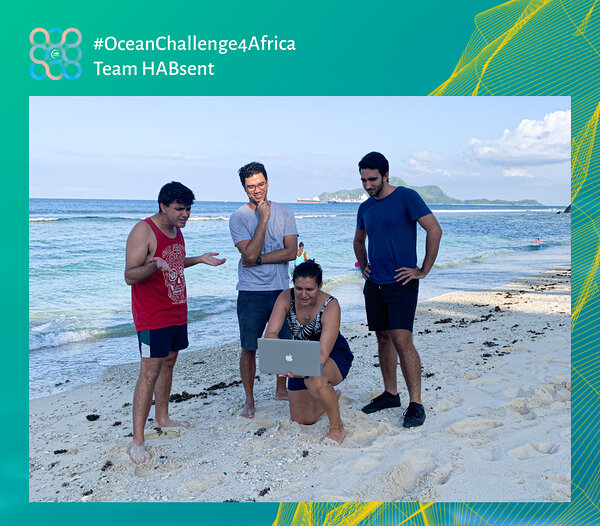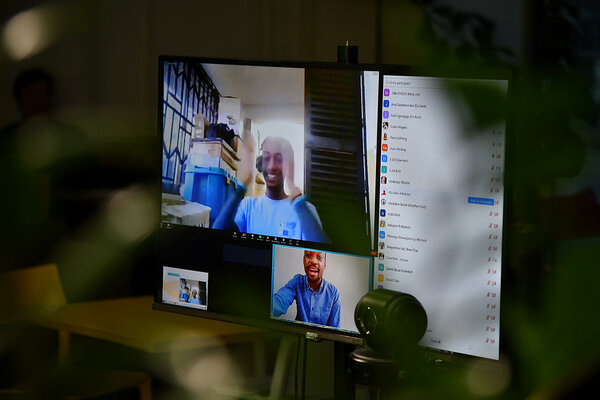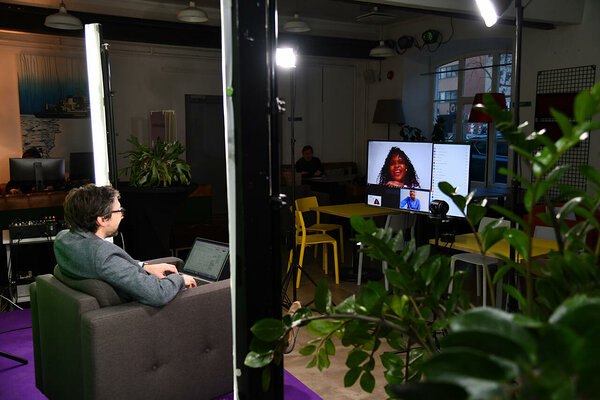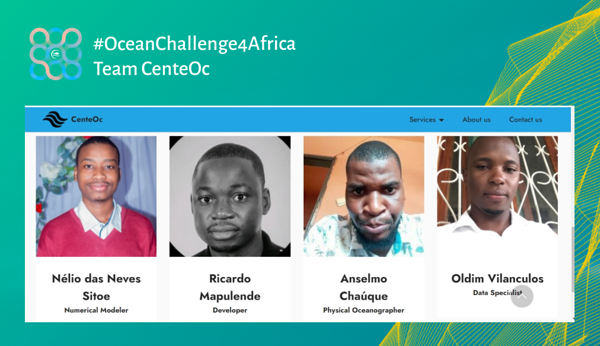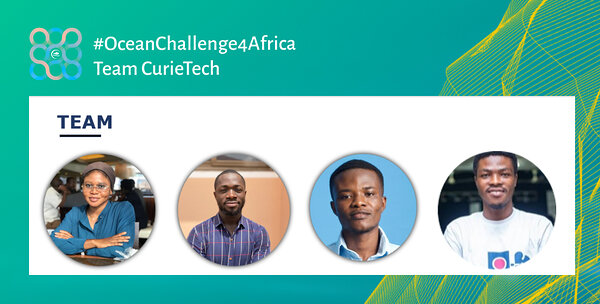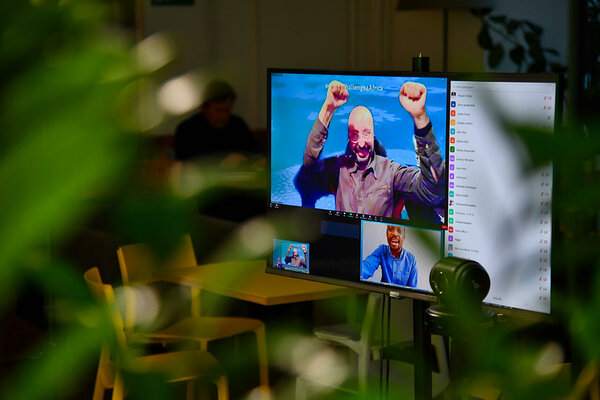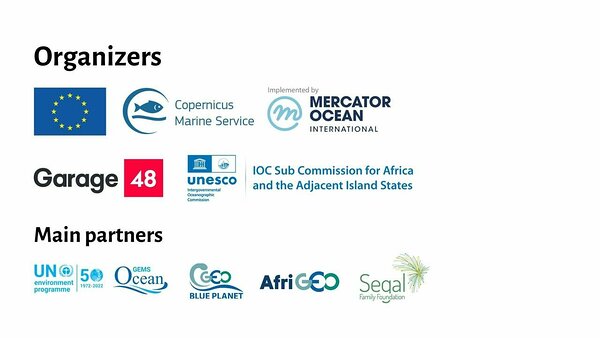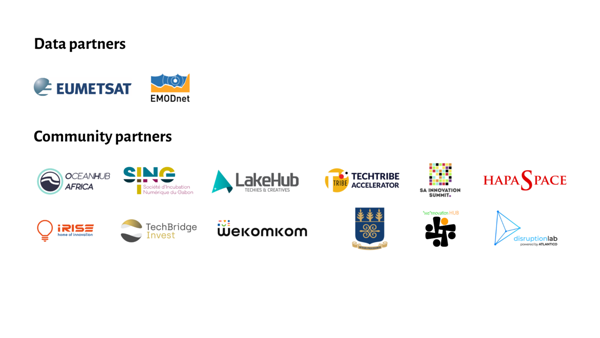The #OceanChallenge4Africa marine data hackathon took place virtually on 8-10 April. The event brought together over 200 participants from all over Africa to build a thriving blue economy and promote a sustainable ocean.
The ocean holds a key to a sustainable future for our planet. With over 35,000 kilometers of coastline, the ocean surrounding Africa undeniably holds a vital role in the lives of many communities, provisioning food, regulating the climate, and boosting tourism and shipping. Unfortunately, it’s being threatened by climate change and increasing pressures from human activities. As a result, the health, resilience, safety and biodiversity of the ocean are suffering.
The main aim for #OceanChallenge4Africa was to support the UN Decade of Ocean Science for Sustainable Development's vision and engage African communities in developing marine Earth Observation-based products. To achieve this, the topic areas were in line with Ocean Decade Outcomes for the Ocean We Want and support the African Union Agenda 2063 frameworks.
This hackathon was brought to life as an initiative for what the UN called the Ocean Decade of Ocean Science. The UN decade motto “the science we want for the ocean we need” illustrates the innovation that this event can bring. Our wish is that the prototypes that come from the hackathon will transform into solutions that are actionable, practical and contribute to the UN’s mission.
- Pierre Bahurel, CEO of Mercator Ocean International
The interest in the hackathon was immense! With the kick-off in January and multiple pre-events building towards the hackathon, we ended up with 880 registrations from 51 countries and 92 idea submissions! Out of these, the 35 best ideas were selected to move forward and take part in the event. The ideas spread between three topic areas: a healthy and resilient ocean; a productive ocean; and a safe ocean. These are three of the seven Ocean Decade Outcomes that describe the Ocean We Want – a framework that strives towards ocean science solutions for sustainable development, connecting people and our ocean.
The teams and the strength of the ideas proved that despite there only being a few universities in Africa teaching marine data related courses, the continent has huge potential in the field. Over the weekend we saw the great motivation of teams to tackle challenges that were close to their hearts.
My experience as a researcher in the aquaculture industry of the island nation of Seychelles made me hyperaware of the risks facing coastal nations that depend on the ocean as a source of protein and revenue. One of these risks is harmful algal blooms, a problem that lends itself to analysis through satellite data, making it a natural path to pursue this event.
- Kara Birkenmayer , Team Lead of HABsent
Similar motivation drove team Cybertech who won second runner up.
We worked harder in the 48hrs than we had worked before. All the while remembering the reason why we had joined the hackathon in the first place – to be part of those who make a difference in ensuring a healthy ocean. After the hackathon, we were tired and sleep-deprived, but at the end of it all, it was worth it!
Another great example proving that anything is possible with great determination was the all-female team Women of Vision. They initially registered with an idea that didn’t qualify for the hackathon as it was not clearly connected to the use of the required Copernicus Marine Service data product, but after attending pre-events and contacting the Copernicus Marine Service Help Desk for guidance regarding the necessary data, they ended up in the finals!
The best teams were awarded monetary prizes from a cash prize pool of 10,000€ (approx $11,000) courtesy of Copernicus EU and Segal Family Foundation, tickets to events, visibility through Copernicus EU and opportunities to develop their idea further at incubators and acceleration programs.
Huge thank you to all the mentors who helped the teams develop their prototypes over the weekend: Triin Preem, David Clark, Henrik Rank, Martin Verrev, Dr. Hayley Evers-King, Sikho Msomi, Jaan Praks, Dr. Marié Smith, Bennet Atsu Foli, Gideon Brefo, Tim Collart, Helen Kokk, Niccolò Bassan, Mika Odido, Fabrice Messal, Romane Zufic, Elena di Medio, Amine El Amrani, Elodie Gutknecht, Simon Van Gennip and Mariin Petoffer.
Meet the winners:
OVERALL WINNER: HABsent
Harmful algal blooms, or HABs, cause revenue losses in the African aquaculture sector and put consumers of farmed seafood at risk. The impact on humans involves seafood toxins, high phytoplankton counts, and mass animal or plant mortalities.
HABsent developed an app to notify people of harmful algal blooms that may be approaching their location. Aquaculture farmers can use the app to take mitigating precautions to protect their stock, and fishermen can use it to inform their fishing locations. Their early warning system protects producers from revenue loss and consumers from health risks.
The team won 3500€, pre-selection to the OceanHub Africa Acceleration Program, free delegate passes to the Ocean Innovation Summit, tickets to SA Innovation Summit, one year access to WEkEO and the opportunity to present the winning project as a “data-user testimony” during a Copernicus EU Marine Service event.
Team members: Kara Birkenmayer, Daniel Hugelmann, Dorian Marie, and Francesco Rocchi.
The four team members met in 2019 at a networking event at a co-working space on the main island of the Seychelles, Mahe. Going forward, the team plans to refine its detection model, develop its user interface further, and connect with potential users to tweak the application to the demands of the market. They are incredibly excited to pursue the opportunities the hackathon has provided them with.
FIRST RUNNER UP: Byteforce
An estimated 40% of fishing along African coastlines is illegal, which leads to over $2 billion of losses. Byteforce developed a mobile app with real-time notifications that provide local authorities with insights about fishing at sea to prevent overfishing and illegal fishing. The app tracks the origin of vessels and notifies relevant authorities who in return can get in contact with local occupants, fishermen and fishing vessel companies.
Illegal fishing is a problem that has been historically hard to fight. We came up with an idea to efficiently tackle it by combining both the influence of local authorities and technology. Thanks to the hard work of all the team members, we won first runner up. We plan to finish the project and find funding to launch our startup in the years to come.
- Yvan Wonkap, Team Lead of Byteforce
The team won 2000€, free delegate passes to the Ocean Innovation Summit, and one year access to WEkEO.
Team members: Yvan Wonkap, Sifikile Bukhali, Njokosi Kawunju, Jephthah Festus, Abouli Abdelkarim, Curtis Akapini and Elisee Tchana.
SECOND RUNNER UP: Cybertech
Climate change greatly affects marine animal and plant species. As a result, many marine species are on the
verge of extinction. Understanding the general impacts of climate change on marine ecosystems and fisheries is a first step towards developing climate-adaptive fisheries management measures.
Team Cybertech generated a model that provides continuous predictive analytics of live weather data to detect deterioration in fish health, welfare, and environment. This will notify operators so they could intervene in time.
The team won 1500€, free delegate passes to the Ocean Innovation Summit and one year access to WEkEO.
Team members: Shamaine Mhondiwa and Steven Tuhame.
When we started the hackathon, we were a team of 7 members but ended up being a team of two. We did not let that defeat us. It was an experience we will never forget, we certainly learned a lot. We’re grateful to the mentors as without them nothing could have happened. They were with us along the way, ensuring that we push and deliver the best we can. Their advice and mentorship contributed to a greater extent to the successful implementation of the project.
- Shamaine Mhondiwa, Team Lead of Cybertech
The end of the hackathon was not the end of team Cybertech. Their next step is to expand the project to be used in other coastal regions of Africa, include a geographical locator that gives values to customers mapped to their exact location, and make the website more understandable to layman fish farmers.
SAFE OCEAN TOPIC AREA AND FAVOURITE OF THE AUDIENCE WINNER: CenteOc
CenteOc is short for "Center for Oceanographic Studies". The team worked on a Forecasting System for Coastal Flood generated by Storm Surges in Beira Central Mozambique, which is an area greatly affected by extreme weather events that induce storm surges and tropical cyclones.
CenteOc's system predicts coastal flooding and alerts the affected communities for them to leave the risky areas and go to safe areas. They used the Global model wind and sea surface pressure from Copernicus to force a regional model to predict the sea surface elevation.
The team won 1000€ and a bag of goodies from Mercator Ocean International.
CenteOc's Favourite of the Audience submission.
Team members: Nelio das Neves Sitoe, Ricardo Mapulende, Anselmo Chauque and Oldim Vilanculos.
After University we decided to join together to create an independent study group whose mission would be related to the investigation and monitoring of oceanographic and meteorological processes in rivers, estuaries, bays and coastal areas of Mozambique. We saw in this hackathon an opportunity to show the world our skills and also a way to earn money to formalize our activities in Mozambique as well as rent an office for the initial phase. Our vision is to be an open research center of national and international reference in Oceanography studies in Mozambique. We believe in sharing information and knowledge to contribute to the development of our country.
- Oldim Vilanculos, Team Member of CenteOc
PRODUCTIVE OCEAN TOPIC AREA WINNER: Project Curiosity
According to United Nations, about 80% of the world’s untreated waste is emitted back into the environment, polluting water bodies like the ocean, lakes, and ponds. This causes fish farmers to waste a lot of resources and leads to the production of poor yields and the generation of low revenue.
Project Curiosity is inspired by NASA's Curiosity rover, which is a large robot that was sent over to the planet Mars to depict whether or not Mars has the right environmental conditions to support small life forms. Unlike NASA’s curiosity rover which is a large robot, project curiosity is a semi-autonomous vehicle that will be deployed on water bodies to measure essential aquatic conditions such as pH, temperature, turbidity, conductivity, oxygen content, and others and inform users of the conditions of their water bodies.
The team won 1000€ and delegate passes to the Ocean Innovation Summit.
Team members: Bawa Daniel, Hamida Mahama, Sarpong Philemon, Joshua Nti
We kept ourselves motivated amidst the pounding headaches and the sleepless nights. It was all worth it in the end! From merely an idea, we developed a product that performs accurate water quality assessments for pH, mole concentration of dissolved oxygen, and mole concentration of dissolved inorganic carbon on these water bodies. In the future, we will begin a final market survey in Ghana and begin the rollout of our systems. With enough revenue generated per our business model, we hope to gain traction and expand our borders globally.
- Joshua Nti, Data Scientist for Project Curiosity
HEALTHY OCEAN TOPIC AREA WINNER: Eagle AI
We all know that marine pollution is a threat to the health of coastal areas, oceans, and waterways. However, until recently, we didn't know much about the effects the plastic in the ocean has on people. A study commissioned by WWF found that in Australia, people consume about 2000 tiny pieces of plastic every week. That’s approximately 21 grams a month, just over 250 grams a year.
Eagle AI developed a prototype of an AI-powered solution to protect the African coast from plastic pollution. Their inclusive solution can detect, quantify and track different kinds of marine pollution, including plastic debris, oil spills, and sargassum floating algae.
The team won 1000€ and a 3-month virtual incubation program with SING SA.
Team members: Salaheddine Kaba, Nadir Sinaceur, Aymane Abouliz and Mouhcine Mitallan
#OceanChallenge4Africa was a once-in-a-lifetime experience. We felt inspired by the hackathon challenge and wanted to contribute to the growing relevance of using Artificial Intelligence and Machine Learning tools in addressing ocean problems and issues. This hackathon helped us build a prototype with a business model that allows connecting all the stakeholders in a virtuous circle. We hope to push our prototype and business model further so that we can create a local circular economy around marine debris.
- Salaheddine Kaba, Team Lead of Eagle AI
A 3-month virtual incubation with SING SA was also awarded to:
Tunisian Leaders – management of algae removal and valuation of the biomasses to provide income for collectors.
Flux – an AI-based harmful algal bloom monitoring and alert system.
Free delegate passes to the Ocean Innovation Summit went to:
Women of Vision – a monitoring system to track water quality parameters.
OceanSavers – an automatic oil pollution detection service
In addition to the teams already mentioned, the TOP14 saw teams:
Blix - a GPS tracking device for fishing vessels to assist managers of fisheries to achieve compliance with fishery management arrangements.
Aqua AI - an AI object detection software that detects plastic pollution hotspots in real-time using satellite data.
Merlisa - integrated hydrospatial techniques that assist in mapping the important parameters that are required in site selection for seaweed farming.
AfriSurge - a website that provides information about storm surge forecasts in NW Africain Atlantic and Gulf Guinea.
If you want to see more of the #OceanChallenge4Africa hackathon:
Check out the behind-the-scenes photo album.
See teams in the Favorite of the Audience photo album.
Rewatch the final demos and the award ceremony.
#OceanChallenge4Africa was organized by Mercator Ocean International, IOC Africa and Garage48; and supported by Segal Family Foundation. It was further held in partnership with the United Nations Environment Programme GEMS Ocean, GEO Blue Planet and the African Group on Earth Observations (AfriGEO). The event was supported by the EU’s Copernicus Marine Service, EMODnet and EUMETSAT data.
